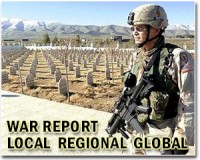 |
Paris (AFP) March 15, 2011 Group of Eight powers Tuesday dropped proposals for military intervention to end bombardments in Libya and turned to the United Nations to increase the pressure on its ruler Moamer Kadhafi with tougher economic sanctions. A drive by France and Britain to impose a no-fly zone over Libya failed to win round the United States, Russia and other European Union powers, in particular Germany, diplomats said, and the G8 power bloc kicked the problem back to the UN Security Council. Diplomats at the UN said separately that the main powers on the Security Council expect to distribute a draft resolution for tougher sanctions against Libya to all council members on Tuesday. G8 foreign ministers "agreed that the UN Security Council should increase the pressure, including through economic measures, for Moamer Kadhafi to leave," said the French minister Alain Juppe. "Ministers called on Moamer Kadhafi to respect the legitimate claim of the Libyan people to fundamental rights, freedom of expression and a representative form of government," said Juppe, host of the talks in Paris, reading a statement. The statement welcomed measures under way at the UN Security Council "as a matter of urgency" to protect Libyans from the fighting between rebels and forces loyal to Kadhafi. However, Juppe later admitted that the plan for a no-fly zone had been overtaken by events in Libya as Kadhafi's forces advance on the rebels. "We feel that it's been overtaken, that that's not what today will stop Kadhafi's advance," Juppe told the parliamentary foreign affairs committee, adding that "we need to talk about it, we could return to our proposal." The Security Council passed an assets freeze and travel ban against Kadhafi and leading members of his family and regime on February 26. It also passed an arms embargo against Libya. Juppe later blamed China for preventing firmer action at the Security Council. "If today we are stuck, it's not only because Europe is impotent, it's because at the Security Council, for now, China doesn't want any mention of a resolution leading to the international community's interference in a country's affairs," he told the foreign affairs committee. "Russia is evolving and the Americans haven't yet defined their position on Libya," Juppe added. Juppe said Kadhafi is outgunning Libya's rebels, whom the leader of four decades has driven out of several towns with shelling and airstrikes. France and Britain wanted their G8 allies to back a no-fly zone to ground Libyan warplanes and France had even talked of targeted air strikes against Kadhafi's strategic sites. The plan has the backing of the 22-nation Arab League, considered crucial for dealing with the region. Russian Foreign Minister Sergei Lavrov said Russia wants more information about how Arab League members envisage a no-fly zone being implemented over Libya. China, the only veto-wielding member of the Security Council not represented at the Paris G8 talks, opposes a no-fly zone. British Foreign Secretary William Hague said the decision should be up to the United Nations. "The G8 is not the decision-making body," he told reporters. Juppe said he hopes for the Council to adopt a resolution "as soon as possible, by the end of the week." The Libyan opposition national council's representative Mahmoud Jibril and his delegation have been seeking formal support abroad and a no-fly zone. France has taken the lead in formally recognising the council as Libya's legitimate representatives. The United States and the European Union have hesitated formally to recognise them, seeking to know more about them first. US Secretary of State Hillary Clinton held a 45-minute "private and candid" conversation with Jibril about how Washington could support the opposition against Kadhafi, her top aide Philippe Reines told reporters. She stopped short of agreeing to Jibril's request to supply the rebels with arms, said an official who asked not to be named. A senior US official later said the United States had named as its special envoy to the council Chris Stevens, previously its deputy chief of mission in Tripoli. A senior official said Stevens would go to Benghazi. burs-rlp-cjo/sj
Share This Article With Planet Earth
Related Links
 Kadhafi forces in new attacks, powers hold talks
Kadhafi forces in new attacks, powers hold talksAjdabiya, Libya (AFP) March 15, 2011 Forces loyal to Libyan strongman Moamer Kadhafi attacked a key rebel-held town Monday, as the major powers remained split on measures to ground his warplanes. Rebel fighters in Ajdabiya said four shells had crashed west of the town, while former air force colonel Jamal Mansur, who had defected from Kadhafi's army, reported air strikes. Mansur also said rebels had regained a foothold in B ... read more |
|
| The content herein, unless otherwise known to be public domain, are Copyright 1995-2010 - SpaceDaily. AFP and UPI Wire Stories are copyright Agence France-Presse and United Press International. ESA Portal Reports are copyright European Space Agency. All NASA sourced material is public domain. Additional copyrights may apply in whole or part to other bona fide parties. Advertising does not imply endorsement,agreement or approval of any opinions, statements or information provided by SpaceDaily on any Web page published or hosted by SpaceDaily. Privacy Statement |